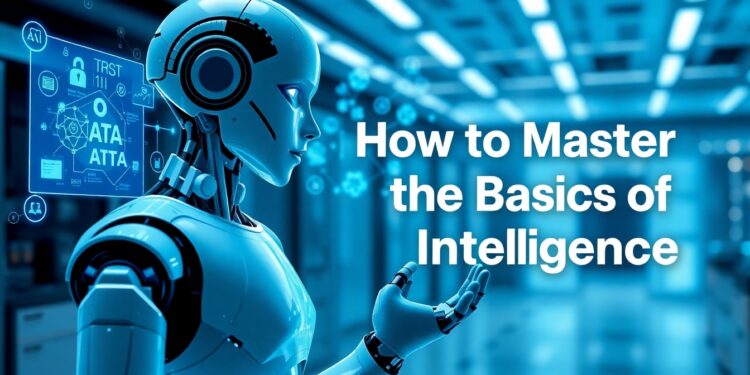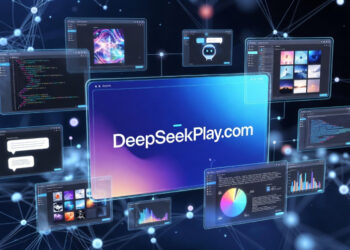Table of Contents
ToggleIntroduction to Artificial Intelligence
What is Artificial Intelligence (AI)?
Artificial Intelligence, or AI, represents the simulation of human intelligence by machines programmed to think, learn, and make decisions. AI is not just a futuristic concept—it’s all around us, shaping industries and enhancing our daily lives. From virtual assistants like Siri and Alexa to recommendation systems on Netflix, AI is an integral part of the modern world.
But what makes AI special? It’s the ability to process massive datasets, recognize patterns, and make informed predictions, often outperforming humans in speed and efficiency.
Why Should You Learn AI Basics?
Learning the basics of AI opens a world of opportunities. Whether you’re a tech enthusiast or a professional looking to upskill, AI knowledge can elevate your career prospects. Companies today are on the hunt for individuals with AI expertise to drive innovation.
On a personal level, understanding AI helps you engage more critically with technology. It’s the key to unlocking how systems around you—from your smartphone to social media—work intelligently.
Understanding the Fundamentals of AI
Core Concepts of AI
To dive into AI, you first need to grasp its core building blocks:
- Machine Learning (ML): ML enables machines to learn from data without explicit programming. It’s like teaching computers to recognize patterns and improve their performance over time.
- Deep Learning: A subset of ML, deep learning uses neural networks modeled after the human brain to solve complex problems, like image and speech recognition.
- Natural Language Processing (NLP): This branch of AI helps machines understand and generate human language. Chatbots and translation tools are great examples.
How AI Works: A Simplified Explanation
At its heart, AI involves data and algorithms. Here’s a simplified breakdown:
- Data Collection: AI systems ingest raw data, which could range from text and images to audio files.
- Data Preprocessing: Cleaning and organizing the data ensures accuracy.
- Model Training: Algorithms learn from the data to create predictive models.
Think of it as teaching a toddler: the more examples you show, the better they understand!
AI vs. Human Intelligence
While AI can process data at lightning speed, it lacks emotional intelligence, creativity, and ethical judgment. AI thrives in repetitive tasks but struggles with abstract thinking—traits that make human intelligence uniquely irreplaceable.
Essential Tools and Platforms for Beginners
AI Programming Languages
- Python: The reigning king of AI programming, Python is beginner-friendly, versatile, and boasts libraries like TensorFlow and Scikit-learn.
- R: If you’re diving into statistical analysis and data visualization, R is your go-to language.
Popular AI Frameworks
- TensorFlow: Developed by Google, TensorFlow simplifies the creation of AI models, from prototyping to deployment.
- PyTorch: Loved by researchers, PyTorch is flexible and widely used in academic settings.
Free Resources to Get Started
You don’t need to break the bank to learn AI. Here are some resources:
- Online Tutorials: Platforms like Coursera, edX, and YouTube offer beginner courses.
- AI Communities: Engage with like-minded individuals on forums like Reddit’s r/MachineLearning or Kaggle discussions.
Learning Strategies for AI Mastery
Develop a Strong Mathematical Foundation
Mathematics is the backbone of artificial intelligence. A solid grasp of essential mathematical concepts will help you understand how AI algorithms work. Start with:
- Linear Algebra and Calculus: These are crucial for understanding matrix operations and optimization techniques used in AI models.
- Statistics and Probability: They are vital for data analysis, understanding distributions, and working with probabilities in machine learning.
For beginners, Khan Academy and 3Blue1Brown on YouTube are excellent resources to start building these skills.
Hands-On Projects
Theory is vital, but practice cements learning. Hands-on projects allow you to see AI in action:
- Building Basic ML Models: Start by working on projects like predicting house prices or building a recommendation system. Use datasets from platforms like Kaggle or UCI Machine Learning Repository.
- Participating in AI Competitions: Platforms like Kaggle and DrivenData host competitions where you can apply your skills, learn from others, and challenge yourself.
Working on practical projects can feel like solving puzzles, and each solved problem brings you one step closer to AI mastery.
Enrolling in AI Courses
AI courses can guide you through the learning process in a structured way. Popular options include:
- Top AI MOOCs: Coursera, edX, and Udacity offer high-quality AI courses from institutions like Stanford and MIT. Andrew Ng’s Machine Learning course is a classic starting point.
- Certifications in AI: Earning certifications, such as Google’s TensorFlow Developer or IBM AI Engineering Professional Certificate, validates your knowledge and skills to potential employers.
Investing time in structured courses ensures that you build a strong foundation and stay on track.
Challenges and Tips for AI Learners
Common Hurdles for Beginners
Learning AI isn’t without its challenges. Here are a few common obstacles:
- Overcoming Complexity in AI Concepts: Beginners often feel overwhelmed by technical jargon and advanced topics like neural networks. Start simple and gradually build up to complex ideas.
- Staying Updated in a Rapidly Evolving Field: The AI field changes constantly, with new research and tools emerging every day. Dedicate time to follow AI blogs, forums, and newsletters to stay informed.
Practical Tips for Success
Mastering AI is a marathon, not a sprint. Here are tips to keep you motivated:
- Consistency in Practice: Dedicate daily or weekly time to learning and practice. Small, consistent steps lead to significant progress.
- Leveraging Peer Networks: Join AI communities and forums to seek advice, share knowledge, and collaborate on projects. Networking can also open doors to mentorship opportunities.
Learning AI can feel daunting, but with persistence and the right strategies, you’ll make steady progress.
Conclusion
The Future of AI and Its Potential
AI is not just transforming industries; it’s redefining the way we live and interact with technology. Its potential is limitless, from revolutionizing healthcare with predictive diagnostics to enhancing education with personalized learning experiences. By mastering the basics, you position yourself at the forefront of this technological revolution.
Your Journey Towards AI Mastery
Starting your AI journey may seem challenging, but each step brings you closer to unlocking its immense potential. Equip yourself with the right resources, stay curious, and embrace the learning process. The basics you learn today could lead to groundbreaking innovations tomorrow.
FAQs
1. What are the prerequisites to start learning AI?
A basic understanding of programming (preferably Python), math, and a curious mindset are all you need to begin learning AI.
2. How much time does it take to master AI basics?
It depends on your dedication and prior experience. On average, 3-6 months of consistent effort is enough to grasp the fundamentals.
3. Is coding knowledge mandatory to learn AI?
Yes, coding is essential for implementing AI algorithms. However, tools like Google’s Teachable Machine allow beginners to experiment with AI without coding initially.
4. What are some beginner-friendly AI projects?
Projects like spam email detection, movie recommendation systems, or handwritten digit recognition are excellent for beginners.
5. Can non-technical people learn AI effectively?
Absolutely! While technical skills are essential for in-depth work, non-technical people can still understand AI concepts and use no-code tools to explore AI applications.





